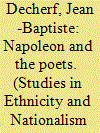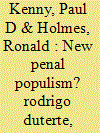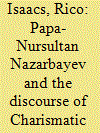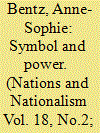|
|
|
Sort Order |
|
|
|
Items / Page
|
|
|
|
|
|
|
| Srl | Item |
| 1 |
ID:
104190


|
|
|
|
|
| Publication |
2010.
|
| Summary/Abstract |
This article uses Max Weber's analysis of charisma to differentiate types of symbolic places. Although Weber did not include the role of space in his analysis of charisma, we can construct different types of spatial charisma based on his distinction between traditional and bureaucratic regimes. Heritage sites and monuments are used by traditional regimes to legitimise their rule by looking back to their charismatic origins, while futuristic places are used to convince the population that bureaucratic regimes will provide a brighter future. In reality these ideal types of charismatic places are almost always mixed. Nation-states combine both types of charismatic places. The analysis of the Zeche Zollverein in Essen, Germany shows that the meaning of a place can change and incorporate both types of spatial charisma at the same time and place. This was the consequence of a deliberate policy to legitimise a new economic regime in Germany's Ruhr area.
|
|
|
|
|
|
|
|
|
|
|
|
|
|
|
|
| 2 |
ID:
104193


|
|
|
|
|
| Publication |
2010.
|
| Summary/Abstract |
Early nationalist thought in nineteenth-century Iran emphasised the lost glories of the Zoroastrian pre-Islamic past, which it held for a utopian society of refinement, progress, and power destroyed by the advent of Islam. This article aims to show the prominence of this archaistic movement in the early phase of Iranian nationalism by highlighting the impact of an Indian Parsi traveller named Manekji Limji Hataria on nationalist intellectuals. Because of his religious background as a Zoroastrian, Manekji came to be perceived as an emissary of Iran's Golden Age. Fully aware of the potential influence this perception granted him, Manekji endeavoured to disseminate neo-Zoroastrian, pre-Islamic-centred, and frankly anti-Arab/anti-Islamic readings of history among intellectuals, and thus succeeded in having a disproportionate influence on the nationalist definition of Iranian history and identity.
|
|
|
|
|
|
|
|
|
|
|
|
|
|
|
|
| 3 |
ID:
104192


|
|
|
|
|
| Publication |
2010.
|
| Summary/Abstract |
The legend of Napoleon has been widely studied by historians; however, little has been written analysing the ways in which this legend brings something new to the history of political ideas. The poets who yielded to a fascination with the dead emperor offered him 'acceptance by his peers', thus creating a typically Romantic new conception of the great man. But Napoleon, as presented by many of the great Romantic writers, was also the object of an extraordinary collective love and enthusiasm. He was, in the words of Balzac, 'the god of the people' (1935, vol. 8: 448). In other words, what is new, in the poets' idealised memory of Napoleon, is the idea of 'extraordinary domination' (Weber), a domination whose mainspring is radically different from that of conventional domination.
|
|
|
|
|
|
|
|
|
|
|
|
|
|
|
|
| 4 |
ID:
174125


|
|
|
|
|
| Summary/Abstract |
Drawing on evidence from the Philippines, this paper investigates the so-called penal populism thesis. Penal populism refers to an understanding of justice in which criminal and anti-social activity should be harshly punished. The paper tests whether support for harsh penal policies, including the use of extrajudicial killings, is associated with underlying populist attitudes and preferences for charismatic leadership. Since coming to power in 2016, President Rodrigo Duterte has waged a violent and highly popular campaign against drug-related criminality. Based on survey modules fielded in 2016 and 2017, the paper demonstrates a positive relationship between populist attitudes and support for the campaign against illegal drugs in general and the extra-judicial killing of suspected drug users and dealers in particular. It also demonstrates a relationship between belief in the charisma of Duterte and support for the campaign against illegal drugs. The implications of the theory and results for the fields of populism and penal populism research are discussed.
|
|
|
|
|
|
|
|
|
|
|
|
|
|
|
|
| 5 |
ID:
104197


|
|
|
|
|
| Publication |
2010.
|
| Summary/Abstract |
Taking a critical perspective on the Weberian concept of charisma this article examines elite and citizen discourse regarding the perceived charismatic leadership and nation-building achievements of the post-Soviet president of Kazakhstan, Nursultan Nazarbayev. Using a number of ideal type features of charismatic leadership based on the typology developed by Roger Eatwell, the article argues that Nazarbayev's leadership does not fit neatly the concept of charisma. Rather, in this instance, Nazarbayev's perceived charismatic leadership as the father of the Kazakhstani nation, and the single politician capable of meeting the challenges of post-Soviet nation-building, is a constructed discursive force projected from above at the elite level, which resonates with public attitudes towards him at the societal level. Charisma represents a discursive mechanism that emphasises President Nazarbayev's centrality to the unity, prosperity, and stability of the nation. This charismatic discourse has aided Nazarbayev in consolidating his authoritarian regime and illustrates the existence of a distinct form of post-Soviet charisma.
|
|
|
|
|
|
|
|
|
|
|
|
|
|
|
|
| 6 |
ID:
104196


|
|
|
|
|
| Publication |
2010.
|
| Summary/Abstract |
This article analyses the relationship between time, charisma, and the personality cult devoted to Nicolae Ceau?escu in communist Romania. It attempts to explore what schemes and devices were used in order to construct his image as a national leader and how time and charisma were dealt with within the process. Ceau?escu was obsessed with both carving a prominent place for himself in the national pantheon and shaping his posthumous image. This involved, first, the construction of his image in historical perspective - Ceau?escu was portrayed as the last and most important in a long lineage of national heroes. Second, it required an emphasis on the relationship between Ceau?escu and the masses. Third, it meant an attempt at mastering time - at delivering an image of Ceau?escu that would survive the passage of time unaltered. By investigating three mechanisms of cult production (stadium celebrations, architectural construction, and the medium of painting) this paper explores the relationship between constructed charisma, the creation of a national hero, and the issue of time within Ceau?escu's personality cult.
|
|
|
|
|
|
|
|
|
|
|
|
|
|
|
|
| 7 |
ID:
104191


|
|
|
|
|
| Publication |
2010.
|
| Summary/Abstract |
This article investigates the ways in which South American shamanism might be analysed in terms of the Weberian concept of charisma, and to ask what is at stake in doing so. It is suggested that this problem might be more rigorously approached by way of a detour through Weber's account of disenchantment, which poses questions about the theological heritage with which our contemporary philosophical and methodological thought is interwoven, and about the particularity of that heritage. As a consequence, it is suggested that contemporary modulations of shamanism can productively problematise customary accounts of the meaning and structure of charisma and of the ways it must be thought to relate to politics in modernity.
|
|
|
|
|
|
|
|
|
|
|
|
|
|
|
|
| 8 |
ID:
111864


|
|
|
|
|
| Publication |
2012.
|
| Summary/Abstract |
This article originated in a brief but inspiring analysis by Margaret Nowak. Nowak used Sherry Ortner's concept of 'summarising symbol' to imply that, much the same way as the American flag was the epitome of the United States to each and every American, the Dalai Lama encompasses everything Tibetan to the Tibetan people. What does this comparison say about the Dalai Lama? I examine the relationship between symbol, power and charisma with Tenzin Gyatso, the current Dalai Lama, as a case in point. With exile, there has been a shift in the symbolic importance of the Dalai Lama, both as a man and as an institution, from a symbol of Tibet and Tibetan Buddhism to a symbol of the Tibetan cause and, more generally, to a symbol of Buddhism in the world. These changes have given Tenzin Gyatso a new authority in the Tibetan community: he is now the unique and unquestioned leader of the Tibetan cause in the world. I discuss the problems that occur when a symbol is also a man and a leader, as well as the solutions proposed, at a moment when the Tibetan community in exile is experiencing democratisation.
|
|
|
|
|
|
|
|
|
|
|
|
|
|
|
|
| 9 |
ID:
109085


|
|
|
|
|
| Publication |
2011.
|
| Summary/Abstract |
This article examines the role and importance of charisma in Tunku Abdul Rahman's leadership of the nationalist movement in Malaya in the 1950s. A Cambridge University-educated prince from the northern state of Kedah, the Tunku turned a disparate group of communal political parties into a potent nationalist movement, the Alliance Party, which secured independence from Britain within five years of its formation. Previous studies have focused largely on his political leadership of the movement and have not examined the element of the Tunku's charisma in the nationalists' campaign. This article examines the political charisma of this leader in the context of recent theories of charisma. Historical evidence indicates that his personal appeal or charisma significantly influenced support for the Tunku's leadership of the nationalist movement, and, at a certain stage, he had almost a cult following. Some of the Tunku's strategies and actions were highly risky and even bordered on the irrational; yet, they were fully embraced by his supporters. The phenomenon of charisma is useful in attempting to understand political galvanisation, such as that instigated by the Tunku, in a way that other theories of political mobilisation (such as legal-rational or traditional leadership) cannot. Drawing on a wide range of primary sources such as the Alliance Party documents and records of the Colonial Office, this article explores the Tunku's charisma as an explanatory factor in the rise of the nationalist movement in Malaya in the 1950s.
|
|
|
|
|
|
|
|
|
|
|
|
|
|
|
|
| 10 |
ID:
170170


|
|
|
|
|
| Summary/Abstract |
After India’s General Election of 2014, political analysts coined the term ‘Modi wave’ to depict the phenomenon of a strong leader who manages to obtain a major gain in a landslide victory. Still wondering whether this would be a one-off phenomenon, analysts found in 2019 to their surprise that India’s most recent Parliamentary elections created a repeat wave. The article theorises the concept of ‘wave election’ and revisits earlier Indian elections to track the appearance of such waves. It then proceeds to examine what may make the most recent Modi ‘wave’ pertinent for future analysis, suggesting that more attention to the phenomenon of charisma and wider transformational agenda of governance rather than excessive focus on religion and saffron elements may be crucial to understand what is happening in India.
|
|
|
|
|
|
|
|
|
|
|
|
|
|
|
|
|
|
|
|
|